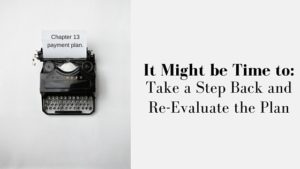Trouble with Plan Payments, What Do You Do?

The story out of Pennsylvania about a chapter 13 debtor (and off-duty police officer) holding up a turnpike fare collection vehicle would have been rich comedic material if it hadn’t involved a real-life shootout and real-life fatalities. But just because good manners prohibit us from chuckling about it doesn’t mean that there’s not some kind of lesson to be learned. For instance, lets say you’re a chapter 13 debtor (police officer or not) and you’re having trouble making your plan payments, what do you do?
First, do not rob a Brinks truck.
Second, consider giving something up. Most high-dollar chapter 13 payments are caused by clients trying to keep a house or the family cars. Throwing some of this financial weight overboard can be painful, but sometimes the money saved by this sacrifice is enough to keep the case going.
Third, consider allowing the case to dismiss and refile a second chapter 13 case. While this sounds extreme, it can actually be an effective strategy in the event that the first case failed because of some unusual or unexpected event occurring, like a job loss or health issues. If you weren’t able to make your $1,750 per month payment because, six months into your case, you lost your job, there’s nothing to say that, once you find a new job, that a second go at a $1,750 per month might not be possible.
Fourth, consider converting your case to chapter 7. This is the most drastic step, but is a natural extension of the second option, above, and preserves the expectation of receiving a discharge of general unsecured debt. It’s important to get something out of your case, even if it’s less than you hoped.
In each of these scenarios, it’s crucial for the at-risk chapter 13 debtor to be realistic about what’s possible. Simple rules-of-thumb, like a reasonable mortgage payment being roughly 1/3 of a family’s monthly income or that a $800 per month car payment is insane, should be considered soberly. And of course, call your attorney to discuss these and other options.
That’s why we’re here. Call or Schedule a Free Consult. We want to help answer your questions regarding your options for bankruptcy.
- About the Author
- Latest Posts
For more than 20 years, the Sasser Law Firm has been helping individuals and business owners sort through financial hardships to see the light at the end of the tunnel. Our North Carolina bankruptcy attorneys are all board-certified specialists, which means we have passed a complex exam, undergone a thorough peer review, and continue to earn legal education credits in this ever-evolving area of law.














